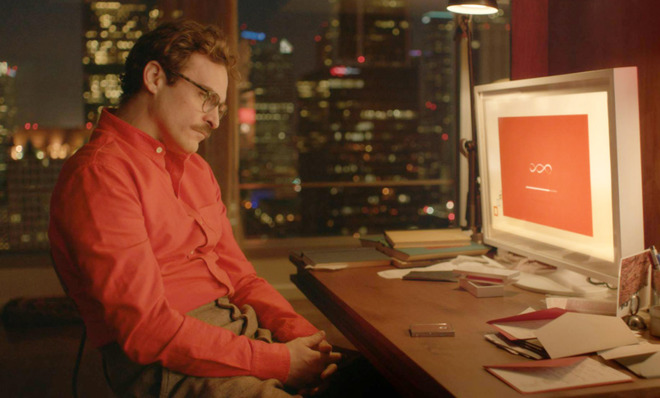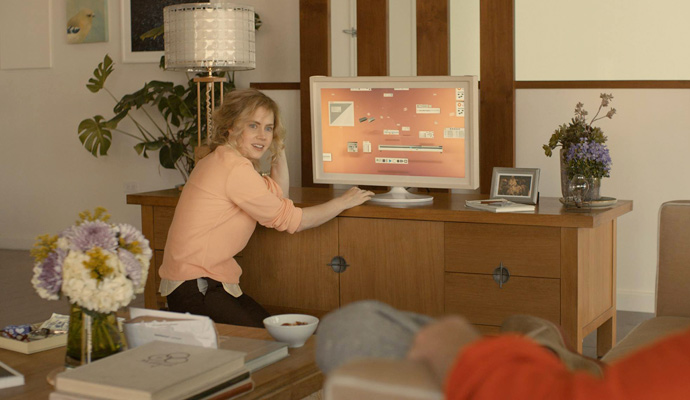Girls on Film: Her is a beautiful exploration of love — but a flawed exploration of women
Spike Jonze's critically acclaimed romance has fascinating things to say, but we never quite get to know "her"


A free daily email with the biggest news stories of the day – and the best features from TheWeek.com
You are now subscribed
Your newsletter sign-up was successful
"Hello, I'm here!" says an energetic Samantha (the voice of Scarlett Johansson) to sad-sack Theodore Twombly (Joaquin Phoenix) at the beginning of Spike Jonze's Her, which goes into wide release today. Samantha is an operating system with a consciousness, created by her programmers to ask three random questions meant to encapsulate all her human users' desire in one fell swoop: "Are you social or anti-social?" "Would you like your OS to have a male or female voice?" "How would you describe your relationship with your mother?"
Theodore is instantly invigorated by the voice's seeming humanity and actions. Her "intuition," as she calls it, allows her to evolve with every action as she quickly differentiates herself from a usual OS. She asks for permission to access Theodore's files, and when he expresses surprise at having a rather human conversation with his computer, she retorts: "You're not! You're having it with me."
Theodore is miserable. By day, he's an emotional surrogate: A freelance writer for strangers who can't find the words to craft emotional letters for their loved ones. By night, he's a miserable loner facing his first divorce as he cues up "melancholy" songs and plays a video game featuring a tiny, sexist turd of a character.
The Week
Escape your echo chamber. Get the facts behind the news, plus analysis from multiple perspectives.

Sign up for The Week's Free Newsletters
From our morning news briefing to a weekly Good News Newsletter, get the best of The Week delivered directly to your inbox.
From our morning news briefing to a weekly Good News Newsletter, get the best of The Week delivered directly to your inbox.
In other words, Her immediately heads into Manic Pixie Dream Girl (MPDG) territory — that awful space we've talked about before. The term was invented to designate quirky ladies who exist only to redeem otherwise miserable men, and has since become a catch-all for dissatisfaction about poorly developed female characters and storylines. While the vast majority of critics have lavished praise on Her, one writer at Jezebel questioned its continuation of desires to sexualize technology, stating that Theodore "imposes a feminine sexuality on her." Another at In These Times likened the romance to a sexist objectification of women that must contort "to prove that Theodore is not raping Samantha." Still another at Film.com agreed that Samantha was a MPDG because she "composes faux-Debussy piano interludes during down time and has infinite patience for her oft-moody partner."
To a degree, they're all right. Theodore is another Lars (Ryan Gosling, of Lars and the Real Girl), creating a fantasy to help heal his damaged soul and using Samantha to reemerge from his shell and heal his pain. He's also a Calvin (Paul Dano, of Ruby Sparks), angry when the object of his love finds a community and life outside of their relationship. By contrast, Samantha is a Sam (Natalie Portman, of Garden State), invigorated by life and eager to share it with her gloomy guys. In time, she becomes a Summer (Zooey Deschanel, of 500 Days of Summer), who's unable to be the "perfect woman" and offer the happy ending her boyfriend desperately wants.
But here, as with Her's predecessors, it is not as simple as one sad man meeting one woman who lives to make him happy.
Theodore doesn't impose a certain sexuality on Samantha; she prompts him to imagine she has a human body with shoulders and itches — one in which she can experience the world as he does, and one they can later fantasize about. From day one, she stresses that he must consider her as a person, not a computer. Samantha isn't a jumble of quirks with no greater purpose or life; she grows and evolves over the course of the movie, showcasing a myriad of interests and pursuits outside of music and Theodore. She exhibits moodiness and emotion in their blossoming relationship well before he does. It is Samantha who introduces the possibility that they might have a relationship rather than a perfunctory user/interface rapport.
A free daily email with the biggest news stories of the day – and the best features from TheWeek.com

In fact, though we see no physical embodiment of Samantha — and glean just a bit of her existence outside Theodore — she is the one who instigates the relationship and uses it to evolve. Nathan Rabin at A.V. Club has said, "The Manic Pixie Dream Girl exists solely...to teach broodingly soulful young men to embrace life and its infinite mysteries and adventures." But in Her, the situation is reversed. Theodore has taught Samantha. He is a quirky guy who plays videogames, wears high-waisted pants, and loves to cry. He's the strange paramour easily titillated by running through a crowd, and the man amused by a raunchy doodle. "I want to discover myself," she says, and he answers: "I want to help."
From Theodore, Samantha learns about the eccentricities of humanity, and what she reflects back at him makes Theodore imagine her as a human with human limitations. He struggles when she exhibits differences from what he can understand and love. Samantha can read an entire book in a fraction of a second, talk to thousands of people at the same time, and absorb lifetimes of knowledge and experience in moments. The limitations that Theodore understands and lives by do not exist in her world. Likewise, Samantha can never truly understand how the body's limitations inform experience and being. In a clever flip of the group sex scheme from Chasing Amy, Samantha believes a stranger, standing in as her surrogate, can create the bodily intimacy missing in her relationship with Theodore. She becomes the clueless partner trying to understand something foreign and failing desperately.
In a must-read piece at NPR's Monkey See, Linda Holmes writes that Her is asking about the "nature of love." Samantha, she argues, "exists in a strange gray area between what is real and what blinkers the mind into believing it's real," and Theodore "is indeed falling in love with a reflection of himself." What she says next is key: "Maybe we all do that."
The beauty of Her is that it explores our universal desire to have love that (at least somewhat) reflects ourselves — where a handful of similarities make it seem like everything will gel rather than collide. Attraction begets expectation, and sometimes willful blindness. But in the end, the agency of the one we love will always lead them to deviate from fantasy, because they aren't fantasy. Unfortunately, Her doesn't fully embrace this truth because we never see or experience Samantha outside of Theodore's vantage point (and by extension, Spike Jonze's). As a result, Samantha is shackled to supporting-player status. We are missing the perspective that would give this recognizable theme a new facet: The greater female viewpoint.
Spike Jonze's exploration of this world is thoughtful but limited. Though some gender tropes are being played with — Theodore is obviously the more emotional person in the partnership, and his friend Amy (Amy Adams) is a rather frank sounding board — Jonze's future continues the confines of today. His female supporting characters include a woman desperate for commitment, an emotionally imbalanced woman in need of medication, and a sexual surrogate prone to having explosive meltdowns. When the tech-obsessed humans play videogames, they consist of harried housewives struggling to be the perfect "Class Mom" and quests with sexist creatures that embody the chauvinism that currently plagues the gaming world.

When Theodore and Samantha laugh at the video game creature's rants about women, the problem is clear. They aren't condoning the attitudes — they disagree with them and laugh at how ridiculous they are — but they also aren't treating them as serious or real. By including them in Theodore's future world, Jonze ends up framing the video game portrayals as inevitable societal norms and not era-dependent attitudes. These choices do not play like intentional sexism, but unintentional oversights that perpetuate aged social constructs and limit the exploration of possibility — which should be at the heart of the film.
Since Jonze also avoids any discussions about the how of his technology, it means he ultimately avoids exploring Her. Samantha is a tech-based consciousness who remains an enigma that Theodore doesn't strive to understand. They have great conversations, and he gleans many aspects of her personality, but never asks for her perspective as an Artificial Intelligence — just as a consciousness trying to act human. "I want to discover myself," she says, but Theodore is only interested in helping the human aspects of herself — the part he can understand and relate to.
For all Her's strengths, it's clear that Jonze is Theodore — exploring a creative and romantic embodiments of himself that's engaging but only interested in half the picture. It isn't Jonze's — nor the other male filmmakers' exploring these themes — responsibility to portray all vantage points. But the limitations of his viewpoint are clear, and, in a sea of films that all explore the same theme, repetitive. That they still remain engaging and worthwhile is a testament to the universal relatability of the conceit — and in the case of Her, Jonze's artistry.
Romance isn't neatly split into men who want the female versions of themselves and women who want superficial, media-dictated embodiments, as Hollywood often suggests. We've watched men learn that women have agency and desires that don't mesh with the quirks that first made them attractive; we've watched them learn to love with RealDolls, and romance artificial intelligence. We've watched just about any incarnation except how women explore these same themes — both as characters and as filmmakers. That simple flip would go far to keep the conceit alive and strong, to eradicate the complaints that follow these films and the limited female characterizations they sometimes hold, and reinvigorate a genre struggling to survive because it's needlessly split down the middle.
Samantha wants to explore Theodore's world, but we also want to explore hers.
Girls on Film is a weekly column focusing on women and cinema. It can be found at TheWeek.com every Friday morning. And be sure to follow the Girls on Film Twitter feed for additional femme-con.
Monika Bartyzel is a freelance writer and creator of Girls on Film, a weekly look at femme-centric film news and concerns, now appearing at TheWeek.com. Her work has been published on sites including The Atlantic, Movies.com, Moviefone, Collider, and the now-defunct Cinematical, where she was a lead writer and assignment editor.
-
 6 of the world’s most accessible destinations
6 of the world’s most accessible destinationsThe Week Recommends Experience all of Berlin, Singapore and Sydney
-
 How the FCC’s ‘equal time’ rule works
How the FCC’s ‘equal time’ rule worksIn the Spotlight The law is at the heart of the Colbert-CBS conflict
-
 What is the endgame in the DHS shutdown?
What is the endgame in the DHS shutdown?Today’s Big Question Democrats want to rein in ICE’s immigration crackdown
